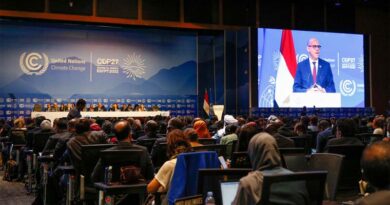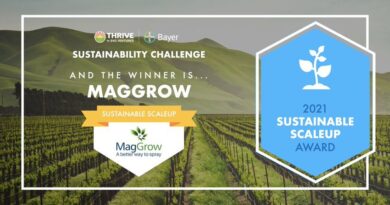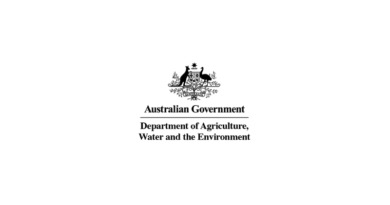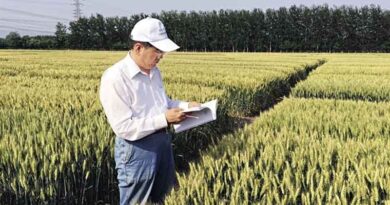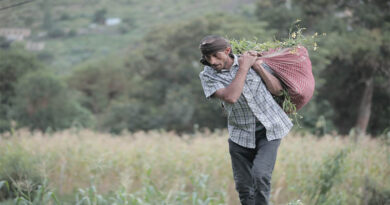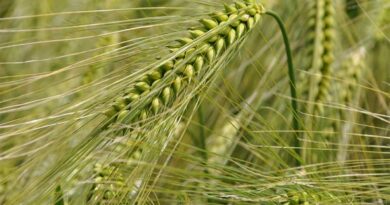CABI’s climate change commitment highlighted at COP26
01 November 2021, Africa: CABI’s commitment to helping millions of smallholder farmers face the hazards driven by climate change will be highlighted at the 26th UN Climate Change Conference of the Parties (COP26) taking place this week and next in Glasgow, Scotland.
COP26 aims to bring the world’s nations together to speed up action towards the goals of the Paris Agreement to limit global temperature increase to no more than 1.5°C. Science dictates that by 2050 at the latest, we should produce less greenhouse gas emissions than we take out of the atmosphere.
But even if this goal is achieved, farmers around the world will continue to face the negative impacts caused by climate change, including increasingly severe and frequent extreme weather events, shifting seasons, and biodiversity loss.
Jonathan Casey, CABI’s Climate Change Manager, is attending the COP26 summit to share insights from CABI’s work and research on climate change to drive science-based action to help smallholders cope with the impacts of climate change. This includes a CABI Briefing on Climate Change which outlines a four-step approach to how we are helping to secure global food security amid the challenges of a warming world.
This includes a focus on invasive species management as a policy tool for integrated climate adaptation, the need to build upon pest risk early warning systems in a changing climate, developing climate-smart pest management for nature-positive agriculture, and utilising nature-based solutions to prioritise biodiversity and the role of more environmentally-friendly biological controls to fight crop pests and diseases.
Jonathan is also speaking at two high-level side events to highlight the investment opportunities that exist in climate-smart agriculture technologies and the need for improved climate risk management tools to enable the acceleration of investment to meet the global target of at least $100bn in climate finance per year.
The first event he will take part in on November 3 – led by the International Fund for Agricultural Development (IFAD) – is entitled ‘Scaling up Private Sector Investments for Smallholder Farmer Climate Adaptation and Resilience. Here Jonathan will be presenting details of the Commercial Agriculture for Smallholders and Agribusiness (CASA) programme’s work on climate risk assessments and investment opportunities in climate smart agriculture technologies. Other attendees of this event include representatives from IFAD, Aceli Africa, Rigetti Computing, the Nordic Development Fund (NDF) and Scipion Capital.
On November 8, Mr Casey will also participate in a side event entitled ‘Developing Climate Resilient Food Systems Pathways – Approaches from Sub-Saharan Africa.’ Here Jonathan will highlight how CABI programmes and projects – such as PlantwisePlus and the Pest Risk Information Service (PRISE) – work in Africa to help farmers mitigate crop pests and disease using a range of digital data and tools.
This event is co-led by CABI and Food, Agriculture and Natural Resources Policy Analysis (FANRPAN) and will include representatives from the University of Leeds (UK), the International Maize and Wheat Improvement Center (CIMMYT), the Economic Justice Network (EJN), CARE International, and the World Bank.
Mr Casey will also participate in the launch of the Adaptation Research Alliance’s climate adaptation research initiative on November 9, that aims to facilitate research projects among 60 members – of which CABI is one – to drive collaborative, interdisciplinary action research on climate change adaptation.
CABI is also delighted to be supporting the Transforming Agricultural Innovation campaign at COP26. We are one of a number of organisations joining the #ClimateShot and sharing stories of innovation in agriculture with a global audience.
Alok Sharma MP, the President of COP26, said in his foreword to the summit, “There is no viable pathway to net zero emissions that does not involve protecting and restoring nature on an unprecedented scale.
“If we are serious about holding temperature rises to 1.5 degrees and adapting to the impacts of climate change, we must change the way we look after our land and seas and how we grow our food.
“This is also important if we want to protect and restore the world’s biodiversity, upon which all life depends.”






